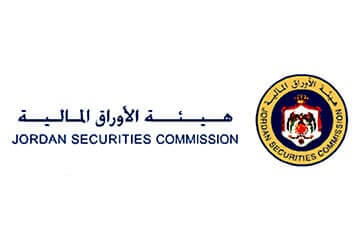Jordan Securities Commission (JSC)
Ever since public shareholding companies formed in the 1930s, the Jordanian public has been subscribing and dealing in shares. Then, in the 1960s, corporate bonds were issued.
However, individual brokerage offices handled the transactions so they needed to organize the market and establish the Amman Financial Market (AFM).
This need gave birth to a leading securities market in the region on January 1, 1978. The AFM had since then become the stock exchange as well as a regulatory body.
Until 1997, three institutions emerged out of what has been the Amman Financial Market. They were The Jordan Securities Commission (JSC), The Amman Stock Exchange (ASE), and The Securities Depository Center (SDC)
The main factors for issuing the Securities Law in the process of reforming the Capital Market were:
- Separation of regulatory function from trading
- Restructuring the market in accordance to international standards
- Creating the legal framework for the issuance of new financial instruments
- Encouraging, attracting, and protecting investors
- Establishing a transparent and fair market
The Jordan Securities Commission was established in 1997. Furthermore, it is a public institution with financial and administrative autonomy to develop, regulate and monitor Jordan’s capital market. This was to maintain a sound investment environment and protect investors.
Developing the capital market is entrusted to the JSC, in accordance with international standards. This is to secure fairness, safety and attract domestic and foreign investors.
Among key economic legislation it has introduced was the issuance of the Securities Law no. 23 in 1997. In fact, it aimed to make a qualitative leap in the history of the national capital market.
The Securities market has made a significant qualitative transition of operating based on international standards. The passage of the Securities Law No. 23 in 1997 had been a landmark and a turning point for Jordan’s capital market.
JSC and Globalization
By the end of 1999, in terms of quantitative development of the securities market, market capitalization increased from JD 286 million in 1978 to JD 4.1 billion. Moreover, the trading volume increased from JD 9.7 in 1978 to JD 389.4 million in the same year.
The number of listed companies increased from 66 companies in 1978 to 152 companies in 1999. In fact, the market value of listed shares reached 75% of the gross domestic income in the same year.
This percentage equals the market value in the developed countries and double overpasses the existing average in emerging markets.
In the past five years, globalization has become the key word in the new world economy. Technology and communication have tremendously evolved with an intense flow of information and trade across borders.
Jordan’s past achievements strive to consider and adopt positive changes in order to cope up with the new trends.
Its legal and organizational structures have been revised. Thus, significant measures have been taken to restructure, liberalize and increase the openness of the national economy.
At the center of these considerations is the development of the Jordan capital market. Major restructuring of the market and its regulations have been implemented. New entities have also been established and developed.
The JSC continues to enforce the Securities Law and its related regulations. This is in order to ensure fairness, sovereignty and proper administration of the rule of law.
It regulates, monitors, and supervises the business operations of the Amman Stock Exchange. This also includes the Securities Depository Center, financial services companies, public shareholding companies, investment funds and certified financial professionals.
Commitment:
For instance, commitments of JSC include:
- Securing investor protection and market development.
- Enforcing disclosure of information regulations pertaining to the securities market.
Objectives:
Furthermore, the objectives of JSC encompasses:
- Regulate & develop the capital market.
- Protect Amman Stock Exchange (ASE) investors in securities.
- Protect the capital market from risks.
Helpful Guidelines for Investing in Securities
Investing in securities is an art & science with rules & regulations to be mindful of. Thus, it requires thorough knowledge & practical experience to assist an investor in choosing among the various available investment opportunities in the market.
If you plan on investing in securities, use the following as a guide:
- You must specify your investment goals accurately & effectively.
- Conformity among dividends & risks: This can be done via analyzing the financial status of issuing companies securities. Establish a diversified securities portfolio to decrease risks & increase profits.
- Benefit from all available information & data on securities. This helps in assessing the status of issuing companies securities. Via financial statements (budgets-profits & losses accounts-cash flow statements & clarifications stated in periodic reports issued by companies) or via press releases & information that companies must disclose by virtue of effective legislation.
- Review the historical background of issuing companies securities. Observe companies future outlook & review future trends of securities prices.
- Follow constantly, trends of the market & economy. Therefore, have a general review of the national level fluctuations in the economy, finance & monetary.
- Ask for assistance from specialized parties. Have financial consultations with parties having technical capacities, experiences & qualified staff to do so.
- Consider the effects of economic, political, regional & international changes on the national economy in general & on issuing companies securities in particular.
- Review the capacity of issuing companies securities in benefiting from technical developments & in developing production. Additionally, review markets for company products & current & future competitive capacity.
- Select a broker that best provides services for clients. That is to create an atmosphere of competitiveness among brokers & to improve the services they provide.
- Beginners or small investors, who lack sufficient experience to deal with securities can invest in mutual funds & in institutions that run investment portfolios. These funds & institutions provide qualified staff to run investment portfolios. They provide an opportunity to diversify investments thus, diversifying risks.
- Support
- Platform
- Spread
- Trading Instrument

